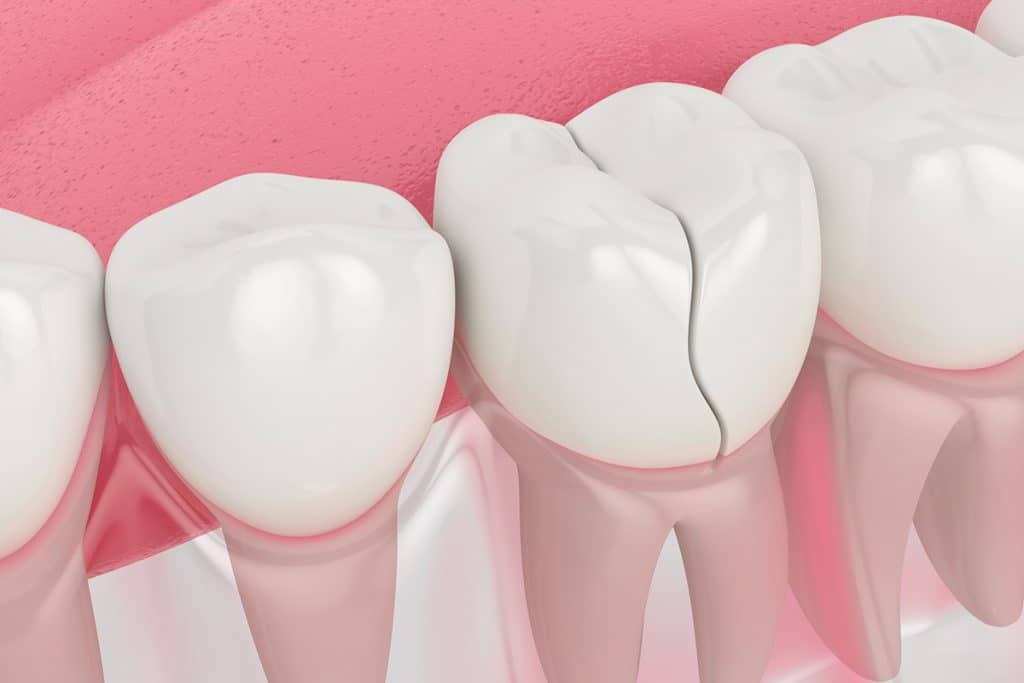How To Tell If You Cracked a Tooth

A cracked tooth is a common dental problem. Cracks of all sizes can develop in teeth due to a variety of causes. Prompt treatment is recommended for cracked teeth because there is a high risk of infection. But not all cracks are easy to see. You may have a small crack in a tooth that you are unaware of. How do you know? Here are 5 signs you cracked a tooth.
- Pain that comes and goes.
Intermittent pain is common with a cracked tooth. It may not hurt all the time like a toothache, but it may hurt for a while and then go away, then come back again. This can make you question whether or not there is a problem that needs to be addressed. If your pain keeps coming back, you should have it checked out.
- Extreme sensitivity.
A cracked tooth may be overly sensitive to cold, heat, or sweets. This is because the crack exposes the nerves inside the tooth, which will react to these aggravators. If your tooth aches after eating or drinking, and the feeling persists after the source is removed, you may have a cracked tooth.
- Swollen gums.
If your gums are swollen in a certain area of your mouth, it may be a sign of a tooth infection. A cracked tooth is highly susceptible to infection because bacteria can enter the root canal through the crack and infect the dental pulp, the soft tissue at the center of the tooth. When this happens, the tooth needs to be treated or it may not survive.
- Pain when chewing.
Sometimes a cracked tooth will only hurt when you are chewing. This is because the force of chewing on the tooth may be opening or widening the crack, further exposing the nerves. If a certain tooth or area of your mouth hurts when you chew in that location, you could have a crack that is not easily visible.
- Discoloration.
A discolored tooth is a sign of an infection or possible internal trauma to the pulp or nerve of the tooth. If you have a single tooth that looks brown or gray from the inside, you may have damage to the dental pulp. Dental trauma can cause a tooth to crack and may also lead to a dental pulp injury. Dental pulp contains blood vessels that may become damaged and lead to bleeding inside the tooth, which can cause discoloration of the tooth.
Treatment for a Cracked Tooth
A cracked tooth will most likely be treated with a root canal and crown. The root canal involves removing the dental pulp from the tooth, disinfecting the root canal, and filling the tooth with composite material. A dental crown is placed over the tooth for protection, allowing the natural root of the tooth to remain in place for support.
Frequently Asked Questions About Cracked Teeth?
Can a cracked tooth always be saved?
In many cases a cracked tooth can be saved. However, there are some situations when a cracked tooth may not be saved and will have to be extracted. When any part of the crack is below the gums, the tooth is less likely to be saved. If the crack is too large or if the tooth is completely split in half, it will need to be extracted.
Will a cracked tooth heal on its own?
A cracked tooth will not heal on its own. Teeth are not capable of healing after significant damage has been done to the dental pulp or “nerve”. The enamel can’t regenerate and the crack will only worsen. Seek treatment as soon as possible if you think you have a cracked tooth.
Why See an Endodontist For a Cracked Tooth?
Endodontists specialize in restoring the health of your teeth, specifically the dental pulp on the inside of the teeth. When a tooth is cracked, the best treatment is a root canal. The doctors at Heart of Texas Endodontics have the skill and expertise that offers the best chance of saving your tooth.
Think you may have a cracked tooth? Contact us today to learn more and schedule an appointment.

